План-конспект уроку англійської мови у 5 класі НУШ "Around the House"
План-конспект уроку англійської мови у 5 класі Учитель: Пащенко Н.В.
Тема: Хатні справи (домашні обов’язки) (Around the house)
Цілі: познайомити учнів із лексичними одиницями на позначення хатніх справ, тренуватися робити припущення на основі візуальних опор, тренуватися впізнавати граматичний час Present Simple у контексті тексту для читання та вживати його в коротких реченнях різних типів (ствердження, питання, заперечення), тренуватися визначати основну ідею тексту та обговорювати її, познайомити із прислівниками частотності та тренуватися вживати їх у коротких реченнях різних типів.
Очікувані результати:
На кінець уроку очікується, що учні зможуть розповідати про свої обов’язки по домогосподарству, вживаючи лексичні одиниці з теми «Хатні справи», граматичний час Present Simple та прислівники частотності (always, usually, often, sometimes, never) у різних типах речень в усному мовленні.
Обладнання: НМК Full Blast 5 (НУШ), картки із завданнями, інтерактивна дошка, аудіозаписи до уроку, онлайн ресурси.
Хід уроку
- Warm-up.
Draw Ss’ attention to the title of the lesson.
• Ask Ss to guess what the lesson will be about.
• Elicit answers.
• Using Ss’ L1 when necessary, ask what things need to be done around their house.
• Help Ss elicit that the phrase Around the house refers to housework (= the chores that need to be done to keep a house clean and tidy).
• Ask Ss to tell you if they know any household chores in English and write them on the board.
- Vocabulary
Aim: to introduce some household chores
• Ask Ss to look at the pictures and read through the list of household chores. Help them elicit the meaning of
the word chores.
• Allow Ss some time to do the activity.
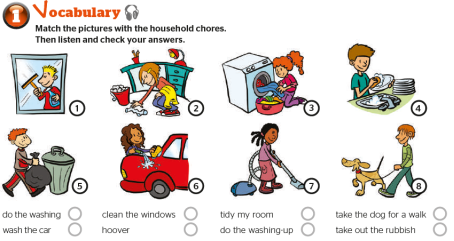
• Play the CD and have Ss check their answers.\ USE https://wordwall.net/resource/38115147/learn-the-chores to check their answers. Make sure that they haven’t got any unknown words. Make Ss repeat the vocabulary.
3. Reading
A. Aims: to give Ss practice in making predictions based on visual prompts, to present vocabulary, structures and functions in the context of a text, to give Ss practice in identifying the main idea of a text.
• Tell Ss to look at the two pictures accompanying the text and ask them the question in the rubric.
• Elicit answers but do not correct Ss at this stage.
• Play the CD and have Ss follow in their books and check their predictions. Tell them to underline any unknown words at the same time.
• Check the answers with the class.
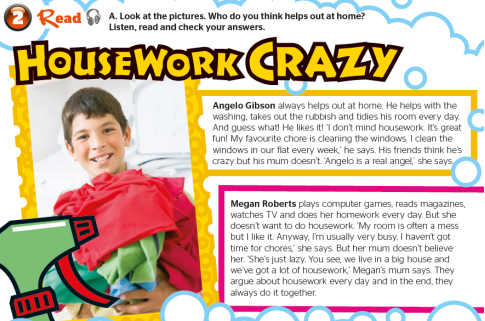
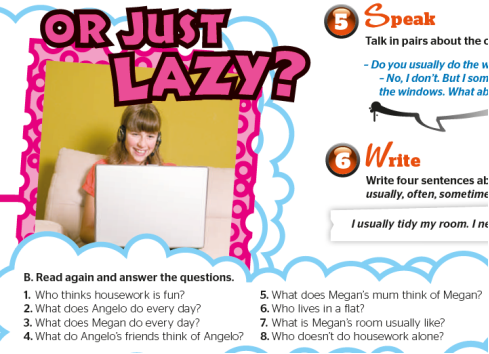
KEY
Suggested answer
Angelo helps out at home.
• Draw Ss’ attention to the title of the text and the adjectives crazy and lazy.
• Help Ss elicit the meaning of the adjectives crazy (= very enthusiastic or excited about sth) and lazy (= sb who
does not want to do anything or does as little as possible) by saying, e.g. Peter is crazy about films. He goes to the cinema every Saturday!, Jane doesn’t tidy her room. She’s lazy!
• Ask Ss some comprehension questions:
What is Angelo’s favourite chore? The windows.
When does he clean the windows in their flat? He cleans them every week.
What does Angelo’s mum think of him? That he’s an angel.
Does Megan want to do housework? No, she doesn’t.
Why doesn’t she want to help with the housework? Because she doesn’t mind the mess. Also, she’s usually very busy
and hasn’t got time for chores.
Does her mum believe her? No, she doesn’t.
Where do Megan and her family live? They live in a big house.
What happens every day? Megan and her mum argue about housework and in the end
they do it together.
B. Aim: to give Ss practice in reading for specific information
• Have Ss do the activity.
• Check the answers with the class.
KEY
1. Angelo.
2. He helps with the washing, takes out the rubbish and tidies his room.
3. She plays computer games, reads magazines, watches TV, does her homework and does housework.
4. They think he’s crazy.
5. She thinks she’s just lazy.
6. Angelo (and his family).
7. It is often a mess.
8. Megan and her mother.
• Explain unknown words and choose Ss to read the text aloud.
Extra activity
Aim: to give Ss further practice in reading and help them memorize the new vocabulary and use the present simple.
• Give Ss card with the text from the book with gaps instead of some key vocab and grammar. Make them in pairs complete the gaps with one word in each gap.
• Check answers together, then use the answer key on the whiteboard to make sure the spelling is correct.
Complete the text
Angelo Gibson always helps _____ at home. He helps with the
_________, takes out the _________ and tidies his ________ every day. And guess what! He likes it! ‘I don’t mind housework. It’s great fun! My favourite _______ is cleaning the _________. I ______ the windows in our flat every week,’ he says. His friends think he’s crazy but his mum doesn’t. ‘Angelo is a real angel,’ she says.
Megan Roberts plays computer games, reads ___________, watches TV and ______ her homework every day. But she doesn’t want to do ___________. ‘My room is often a _____ but I like it. Anyway, I’m usually very busy. I haven’t got time for _______,’ she says. But her mum _______ believe her. ‘She’s just lazy. You see, we live in a big house and we’ve got a lot of housework,’ Megan’s mum says. They argue about housework every day and in the end, they _______ do it together.
4. Post-reading
Aim: to give Ss the opportunity to have a further discussion on the topic of the reading text
• Ask Ss:
Do girls help out at home more than boys?
Do you help out?
Does your father help out at home?
Which chores do boys/men usually do?
• Elicit answers and initiate a short discussion.
- Grammar: Adverbs of frequency
Aim: to present and give Ss practice in using adverbs of frequency
• Draw Ss’ attention to the graph (PRESENTATION) and explain that always equals 100% and never equals 0%.
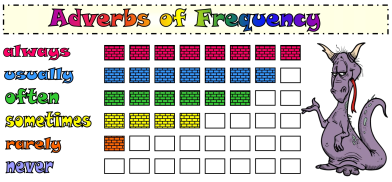
• Read out the rules and demonstrate the position of the adverbs of frequency in the sentences.
• Refer Ss to the text and ask them to underline all the sentences containing adverbs of frequency (Angelo
Gibson always helps out at home, My room is often a mess..., I’m usually very busy..., they always do it
together).
• Refer Ss to the Grammar Reference (p. 124).
Activity 1 (SB p.43 ex.3)
• Have Ss do the activity.
• Check the answers with the class.
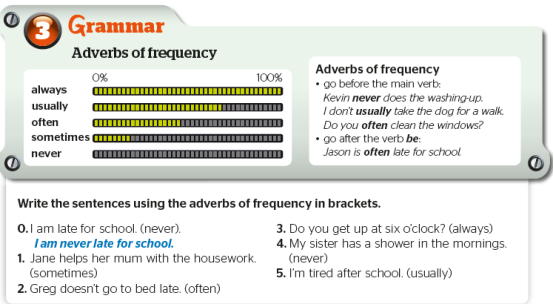
KEY
1. Jane sometimes helps her mum with the housework.
2. Greg doesn’t often go to bed late.
3. Do you always get up at six o’clock?
4. My sister never has a shower in the mornings.
5. I’m usually tired after school.
Activity 2 (individual cards)
• Put the adverbs in the correct place as in the example. Ss individually complete the task, then compare the results in pairs, then use the answer key on the whiteboard.
0 I drink a glass of milk in the morning. (always)
I always drink a glass of milk in the morning.
1 Kate washes her car at the weekend. (always)
2 My mother hoovers on weekdays. (often)
3 Sam takes his dog for a walk to the park. (sometimes)
4 Ben does the washing. (never) His sister does it. (always)
5 Joanne doesn't take out the rubbish. (usually)
6 They are late for school. (never)
7 I tidy my room every Saturday. (usually)
8 My dad does the washing-up in the evening. (often)
9 Maria helps out at home. (sometimes)
10 My room is a mess. (never)
Activity 3 (online – random wheel)
• Use https://wordwall.net/resource/38114823/my-daily-routine to play the Random Wheel activity. Ss spin the virtual wheel and answer the questions using the Present Simple and the proper adverbs of frequency.
Activity 4 (extra – survey, individual cards)
• Ss get the cards with ‘How often do you…?’ and a list of chores. In pairs Ss ask and answer and complete the survey card.
• Ss share the results talking about their partner’s household routine.
|
How often do you…
|
always |
usually |
often |
sometimes |
never |
|||||
|
I |
my friend |
I |
my friend |
I |
my friend |
I |
my friend |
I |
my friend |
|
|
help out at home |
|
|
|
|
|
|
|
|
|
|
|
do the washing? |
|
|
|
|
|
|
|
|
|
|
|
take out the rubbish? |
|
|
|
|
|
|
|
|
|
|
|
do the washing-up? |
|
|
|
|
|
|
|
|
|
|
|
hoover |
|
|
|
|
|
|
|
|
|
|
|
clean the windows |
|
|
|
|
|
|
|
|
|
|
|
wash the car |
|
|
|
|
|
|
|
|
|
|
|
take the dog for a walk |
|
|
|
|
|
|
|
|
|
|
|
tidy your room |
|
|
|
|
|
|
|
|
|
|
- Feedback.
- Homework: to learn the new vocabulary, to do WB p.33 exs. A, B.

про публікацію авторської розробки
Додати розробку
